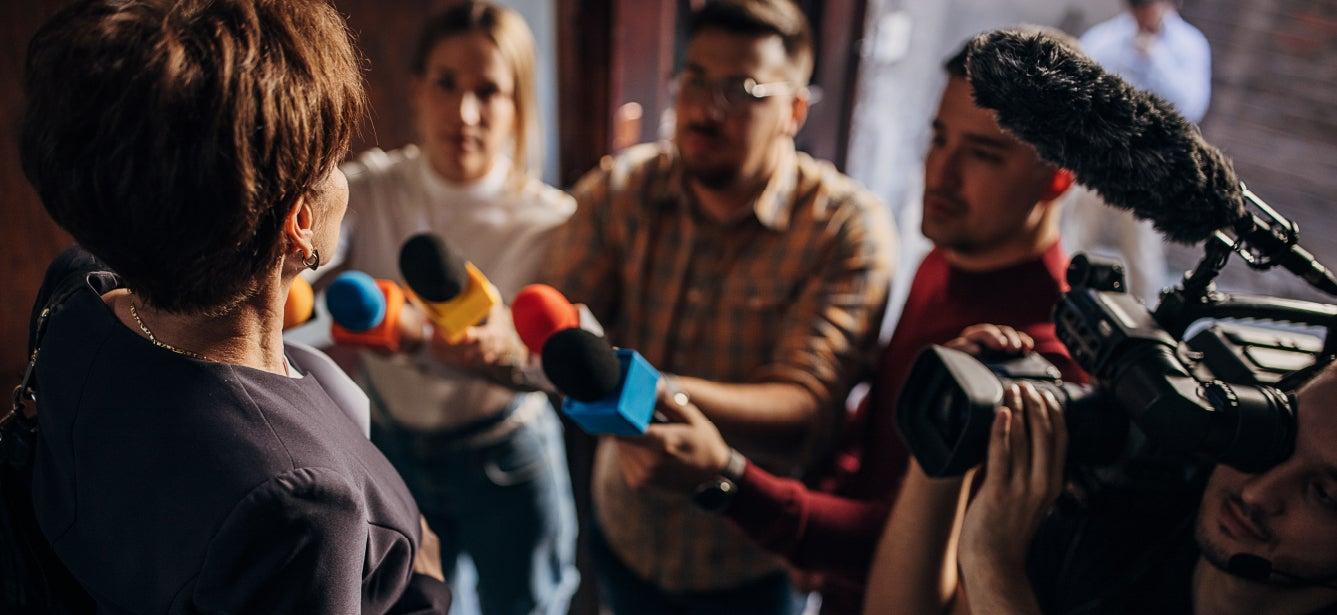Falls Prevention Awareness Week Social Media Best Practices and Toolkit

Spread falls prevention awareness and education on social media. Use our sample messaging in this social media toolkit we've developed to promote Falls Prevention Awareness Week any time during the year.
Social media makes it easy to share educational information and improve awareness about preventing falls. Use the our sample messaging and graphics provided in this social media toolkit to promote falls prevention on social media – whether it’s during Falls Prevention Awareness Week or at any time during the year.
We all have a role to play in preventing falls
Falls prevention is a team effort. These graphics highlight the value of each community member in preventing falls and encourage older adults to work with specific members of their community on falls prevention efforts.
| Family & Friends | Occupational Therapists | Doctors |
| Pharmacists | Fire Departments | Physical Therapists |
| Neighborhood | ||
*The graphics above are provided in English.
Additional information on the vital role of team support for falls prevention:
- Delivering Home Modifications That Meet Older Adults' Needs
- Strengthening Falls Prevention Efforts with the Help of First Responders
- Family Caregivers: Part of the Falls Prevention Team
Highlight evidence-based programs on social media
Falls Prevention Awareness Week provides an opportunity to increase awareness of evidence-based falls prevention programs and encourage older adults to get involved.
Use NCOA's falls prevention social media toolkit to help your organization recruit more older adults to your evidence-based falls prevention programs. The toolkit includes:
- Short videos that depict and highlight evidence-based falls prevention programs
- Messaging for social media platforms
- Key falls facts to strengthen your social media messaging
Promote six steps to prevent a fall on social media
Older adults have the power to reduce their risk of falling. NCOA’s 6 Steps to Prevent a Fall provides simple tips for enhancing safety and maintaining independence. In the following section, platform-specific social media posts and related graphics are presented for each of the six steps.
| Step 1: Find a good balance and exercise program. | |||
| Platform | Sample Text | Visual Content | |
|
As we age, it’s common to worry about falling. But there are evidence-based exercise programs that can help improve balance, strength, and flexibility! The @National Council on Aging offers resources to help you stay #FallsFree #StayHealthy and by finding an exercise program in your area. #FallsPreventionAwarnessWeek #FPAW25 https://bit.ly/FPAW-Find-A-Good-Exercise-Program | |||
|
As we age, it’s common to worry about falling. But there are exercise programs that can help improve balance, strength, and flexibility! @ncoaging can help you stay #FallsFree by finding an exercise program in your area. Link in bio! #FallsPreventionAwarenessWeek #FPAW25 | |||
|
Everyone can take proactive steps to prevent #Falls. There are fun and engaging evidence-based #PhysicalActivity and #Exercise programs that can help you modify your daily habits and routines to prevent falls. Use this handout from the @National Council on Aging to find a program in your community! #FallsPreventionAwarnessWeek #FPAW25 https://bit.ly/FPAW-Find-A-Good-Exercise-Program | |||
| X | As we age, it’s common to worry about falling. But there are exercise programs that can help improve balance, strength, and flexibility! Learn more from @NCOAging and find a program to help you stay #FallsFree in your area today. https://bit.ly/FPAW-Find-A-Good-Exercise-Program | X | |
| Step 2: Talk to your health care provider. | |||
| Platform | Sample Text | Visual Content | |
|
Did You Know: 1 in 4 older adults fall each year, but only half tell their doctor. If you’ve fallen, you’re not alone! Use these tips from the @National Council on Aging to get the most out of important #FallsPrevention conversations with your doctor. #FallsPreventionAwarenessWeek #FPAW25 | |||
|
1 in 4 older adults fall each year, but only half tell their doctor. If you’ve fallen, you’re not alone! Use the tips from @ncoaging at the link in our bio to get the most out of important #FallsPrevention conversations with your doctor. #FallsPreventionAwarenessWeek #FPAW25 | |||
|
You can help #OlderAdults be more comfortable talking to their doctor about #Balance and #Falls. This handout from the @National Council on Aging provides easy steps for having an empowered conversation about #FallsPrevention with your healthcare provider. https://bit.ly/FPAW-Talk-to-Your-Doctor #FallsPreventionAwarenessWeek #FPAW25 | |||
| X |
If you’ve fallen, you’re not alone! Use these tips from @NCOAging to get the most out of #FallsPrevention conversations with your doctor. #FallsPreventionAwarenessWeek | X | |
| Step 3: Regularly review your medications. | |||
| Platform | Sample Text | Visual Content | |
| Facebook and Instagram |
Taking more than one medication can increase the chance of side effects and medication interactions and raise your risk of #Falling. That’s why it’s important to talk to your doctor regularly! Here are 5 things from the @National Council on Aging to remember when reviewing your medications with your provider.. https://bit.ly/FPAW-Review-Medications-with-Your-Doctor #FallsPreventionAwarenessWeek #FPAW25 | Facebook and Instagram | |
|
Taking more than one medication can increase the chance of side effects, medication interactions, and raise your risk of #Falling. That’s why it’s important to talk to your doctor regularly! Check out the tips from @NCOAging at the link in our bio for 5 things to remember when reviewing your medications with your provider. #FallsPreventionAwarenessWeek #FPAW25 | |||
|
When #OlderAdults take more than one medication, it can increase their chance of side effects, medication interactions, and raise their risk of #Falling. Check out these tips from the @National Council on Aging to help older adults reduce their risk of falling with regular medication reviews. #FallsPreventionAwarenessWeek #FPAW25 | |||
| X |
Medication side effects, like dizziness and sleepiness, can increase your risk of #Falling. @NCOAging shares 5 things to remember when reviewing your medications with your provider. #FPAW25 | X | |
| Step 4: Get your vision and hearing checked. | |||
| Platform | Sample Text | Visual Content | |
| Facebook and Instagram |
Your vision and hearing play an important role in good balance, which is needed for everyday activities to prevent falls. Check out these tips from @National Council on Aging to keep your eyes and ears healthy to prevent falls. https://bit.ly/FPAW-Care-for-Your-Vision-Hearing #FallsPreventionAwarenessWeek #FPAW25 | Facebook and Instagram | |
|
Your vision and hearing play an important role in good balance, which is critical for preventing falls. Explore ways to keep your eyes and ears healthy to prevent falls. Link in bio! #FallsPreventionAwarenessWeek #FPAW25 | |||
|
Your #Vision and #Hearing play an important role in maintaining your balance and reducing falls risk. The @National Council on Aging shares five easy tips to keep your eyes and ears healthy to prevent falls. https://bit.ly/FPAW-Care-for-Your-Vision-Hearing #FallsPreventionAwarenessWeek #FPAW25 | |||
| X |
Did you know your vision and hearing play an important role in balance and preventing #falls? Explore 5 easy tips from @NCOAging to keep your vision and hearing healthy. #FallsPreventionAwarenessWeek | X | |
| Step 5: Keep your home safe. | |||
| Platform | Sample Text | Visual Content | |
|
Removing clutter and improving lighting are two easy ways to reduce your risk of #Falls in your home. Find more ideas on how to combat household hazards and keep your home safe from the @National Council on Aging. https://bit.ly/FPAW-Make-Your-Home-Safe #FallsPreventionAwarenessWeek #FPAW25 | |||
|
Removing clutter and improving lighting are two easy ways to reduce your risk of #Falls at home. Check out the link in our bio for more ideas to combat household hazards and keep your home safe from @ncoaging. | |||
|
Many of us want to continue living at home as we age. Follow these simple steps from the @National Council on Aging to keep your home safe and reduce falls risk. https://bit.ly/FPAW-Make-Your-Home-Safe #FallsPreventionAwarenessWeek #FPAW25 | |||
| X |
Making simple modifications to your home can help you stay independent and #FallsFree. Use these tips from @NCOAging to make your home safer. #FallsPreventionAwarenessWeek | X | |
| Step 6: Talk to your family and friends. | |||
| Platform | Sample Text | Visual Content | |
|
If you’ve experienced a fall, you’re not alone. Use these tips from @National Council on Aging to start a conversation with your family and friends about how to protect yourself. https://bit.ly/FPAW-Talk-to-Your-Family #FallsPreventionAwarenessWeek #FPAW25 | |||
|
If you’ve experienced a fall, you’re not alone. Use these tips from @ncoaging at the link in our bio to start a conversation with your family and friends about how to protect yourself. #FallsPreventionAwarenessWeek #FPAW25 | |||
|
Family and friends can help #OlderAdults stay #FallsFree, and it all starts with a conversation. This handout from the @National Council on Aging offers 5 tips to empower older adults to lean on family and friends to reduce their falls risk. https://bit.ly/FPAW-Talk-to-Your-Family #FallsPreventionAwarenessWeek #FPAW25 | |||
| X |
If you’ve experienced a fall, you’re not alone. Use these tips from @NCOAging to start a conversation with your family and friends about how to protect yourself. #FallsPreventionAwarenessWeek #FPAW25 | X | |
You can also promote NCOA's Falls Free® CheckUp along with your social media posts. Falls Free® CheckUp is a simple, 13-question, digital assessment that provides older adults with a personalized "falls risk" score and resources to prevent falls. Use our logos and banners to promote Falls Free® CheckUp.
Social media best practices
Follow these best practices whenever you post:
- Use the @ sign on each social media platform to tag NCOA and your organization’s social handles. Links to NCOA’s social media accounts:
- Schedule posts on each platform at times that your audience is most likely to see them.
- Use the #FPAW25, #FallsFree, and #FallsPreventionAwarenessWeek hashtags on all social media to find other organizations and thought leaders talking about falls prevention.
- Where you can, try to incorporate the following hashtags, where character count allows: #WeAgeWell #AgingWellMatters
- If you can only have one, please include #WeAgeWell
- Links can only be shared via Facebook, X, and LinkedIn. Instagram is an image- sharing-only platform and does not support links in posts. Links can be shared on Instagram by adding a link to your bio or sharing a link via an Instagram Story.
Email campaigns to promote falls prevention
Email campaigns are another effective strategy for improving awareness of falls prevention and encouraging older adults to get involved in evidence-based programming to reduce their falls risk. It is important to tailor your email messaging to your audience.
Email messaging examples for older adults and caregivers
| Subject: Take the Falls Free CheckUp today! |
|
Body: Falls are not a normal part of aging and can be prevented! In observance of National Falls Prevention Awareness Week, take the National Council on Aging’s (NCOA) Falls Free® CheckUp. This no-cost, 13-question digital assessment will provide you with a personalized overview of your falls risk and related tips to help you remain independent and falls-free. Share the Falls Free® CheckUp with your family and friends to ensure all of your loved ones remain healthy and safe! For additional information on falls prevention and healthy aging, visit NCOA’s website. |
| Subject: Find a class to reduce your falls risk |
|
Body: Did you know that there are several evidence-based programs that can help you lower your falls risk? In observance of National Falls Prevention Awareness Week, we encourage you to learn more about the many evidence-based falls prevention programs that can help you and your loved ones stay active and independent. Learn more about evidence-based falls prevention programs! [Add information about upcoming falls prevention programs in your area and encourage email recipients to sign up] For additional information on falls prevention and healthy aging, visit the National Council on Aging’s (NCOA) website.
|
| Subject: Take action to prevent a fall |
|
Body: Did you know that you can prevent your falls risk with just a few simple steps? During Falls Prevention Awareness Week, explore handouts created by the National Council on Aging that highlight 6 easy tips to prevent a fall. This includes recommendations to keep your home safe, discuss stability concerns with your doctor, find a local exercise program, keep your eyes and ears healthy, and more! Check out the following links to learn more about each of the 6 Steps to Prevent a Fall:
Share these resources with your family and friends to ensure all of your loved ones remain healthy and safe! |
Email messaging examples for aging services professionals
| Subject: Remind older adults to discover their falls risk today |
|
Body: Falls continue to be a national public health concern. Join us on [insert FPAW dates] for National Falls Prevention Awareness Week, a nationwide effort to raise awareness of the importance of falls prevention. Empower older adults to discover their personalized falls risk by sharing the National Council on Aging’s (NCOA) Falls Free® CheckUp. This simple, 13-question digital tool provides older adults with a personalized overview of falls risk factors and ways to address them. Help us engage older adults so they can stay independent and falls-free. For additional resources on falls prevention, view NCOA’s Falls Prevention Toolkit. |
| Subject: Connect older adults with programs to reduce their falls risk! |
|
Body: Did you know that there are several evidence-based programs that can help older adults lower their falls risk? In observance of National Falls Prevention Awareness Week, we encourage you to learn more about the many evidence-based falls prevention programs that can help the older adults you work with stay active and independent. Learn more about evidence-based falls prevention programs! [Add information about upcoming falls prevention programs in your area and encourage email recipients to share the information with their networks.] For additional information on falls prevention and healthy aging, visit the National Council on Aging’s (NCOA) website. |
| Subject: Empower older adults to take action to prevent falls |
|
Body: Older adult falls can be prevented with a few easy steps. Join us [insert FPAW dates] for National Falls Prevention Awareness Week, a national effort to increase awareness of falls prevention and empower older adults to take the first step to reduce their falls risk, be independent, and remain falls- free. The National Council on Aging (NCOA) has created a suite of handouts and resources that provide easy tips for older adults to find an exercise program, make modifications to their home, start a conversation with family and friends about falls, and more. View NCOA’s Falls Prevention Toolkit and share this important information with your network! |
Visit the Falls Prevention Awareness Week Toolkit to view all of NCOA's available Falls Prevention Awareness Week campaign assets!
This project is supported by the Administration for Community Living (ACL), U.S. Department of Health and Human Services (HHS) as part of a financial assistance award totaling $5,000,000 with 100 percent funding by ACL/HHS. The contents are those of the author(s) and do not necessarily represent the official views of, nor an endorsement, by ACL/HHS, or the U.S. Government.
Prepare for Falls Prevention Awareness Week
How to Plan a Falls Prevention Event



